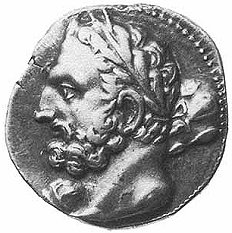 Hamilcar was a common Punic name; in fact, another general of the same name preceded him in command. Barca was perhaps a family name, though more probably an epithet meaning "Lightning."
Hamilcar was a common Punic name; in fact, another general of the same name preceded him in command. Barca was perhaps a family name, though more probably an epithet meaning "Lightning."
Hamilcar Barca (d. 229/8 B.C.)
General who assumed command of the Carthaginian forces in Sicily during the last years of the First Punic War with Rome (264-241 BC). Until the rise to power of his son Hannibal, Hamilcar was the finest commander and statesman that Carthage had produced.
Nothing is known of Hamilcar before he was given command of the Carthaginian forces in Sicily in 247 during the First Punic War. Hamilcar was a common Punic name; in fact, another general of the same name preceded him in command. Barca was perhaps a family name, though more probably an epithet meaning "Lightning."
Hamilcar was a common Punic name; in fact, another general of the same name preceded him in command. Barca was perhaps a family name, though more probably an epithet meaning "Lightning."
By 247, when Hamilcar took charge in Sicily, Carthage had lost to Rome all of its Sicilian possessions except Lilybaeum (now Marsala) and Drepanum (now Trapani). While harassing Roman troops with guerrilla tactics in western Sicily, Hamilcar staged a landing on the north coast, capturing Mount Ercte (probably Pellegrino near Palermo), which he held in the face of determined Roman attempts to dislodge him (247-244). From this area he mounted naval expeditions against the shores of Sicily and southern Italy. He then left Ercte for Mount Eryx (modern Erice near Trapani), which he held until 241. After the defeat of the Carthaginian fleet in that year by Gaius Lutatius Catulus, Hamilcar made a treaty with the Romans that ended the war but obligated Carthage to pay Rome a huge indemnity and to surrender all land in Sicily. Thus, in 241, the First Punic War drew to a close with the establishment of a new imperial power in the West. It was the first chapter in the history of the Roman Empire.
Hamilcar then returned to Africa, where his mercenary troops, long unpaid, revolted in what is known as the "Mercenaries' War" (or "Truceless War"). Hamilcar raised an army of 10,000 with Rome's cooperation and battled the rebels for four years before recapturing his provinces in north Africa. His victory over the mercenaries in 237 contributed to his growing political power in Carthage and led him to pursue territory in Spain as compensation for the loss to Rome of Sicily and Sardinia.
Hamilcar spent nine years in Spain. With Hannibal and son-in-law Hasdrubal (the Handsome), he and an army of elephants and Phoenician and Numidian troops battled Iberian tribes, founded the city of Akra Leuke (modern Alicante), acquired huge quantities of Spanish bullion, and solidified new political and military alliances.
In expanding his power to the European continent, Hamilcar reinvigorated the Carthaginian empire, regained needed resources, and prepared a base for renewing war against Rome, which his son Hannibal would famously do in the Second Punic War. Hamilcar died in battle, most likely drowning in the Jucar River while besieging a place called Helice and trying to escape from a Celtiberian army. (Encyclopaedia Britannica Article)